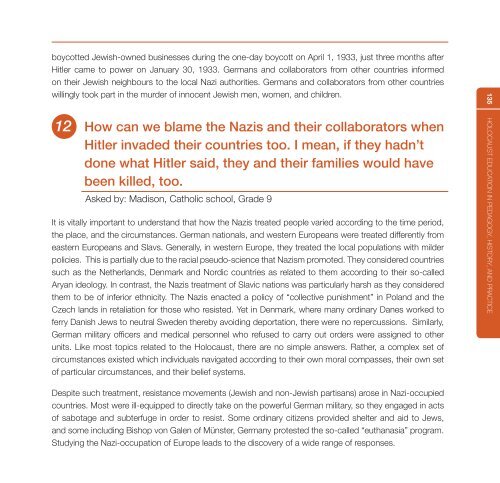2kNreeJ
2kNreeJ
2kNreeJ
You also want an ePaper? Increase the reach of your titles
YUMPU automatically turns print PDFs into web optimized ePapers that Google loves.
oycotted Jewish-owned businesses during the one-day boycott on April 1, 1933, just three months after<br />
Hitler came to power on January 30, 1933. Germans and collaborators from other countries informed<br />
on their Jewish neighbours to the local Nazi authorities. Germans and collaborators from other countries<br />
willingly took part in the murder of innocent Jewish men, women, and children.<br />
12 How can we blame the Nazis and their collaborators when<br />
Hitler invaded their countries too. I mean, if they hadn’t<br />
done what Hitler said, they and their families would have<br />
been killed, too.<br />
Asked by: Madison, Catholic school, Grade 9<br />
It is vitally important to understand that how the Nazis treated people varied according to the time period,<br />
the place, and the circumstances. German nationals, and western Europeans were treated differently from<br />
eastern Europeans and Slavs. Generally, in western Europe, they treated the local populations with milder<br />
policies. This is partially due to the racial pseudo-science that Nazism promoted. They considered countries<br />
such as the Netherlands, Denmark and Nordic countries as related to them according to their so-called<br />
Aryan ideology. In contrast, the Nazis treatment of Slavic nations was particularly harsh as they considered<br />
them to be of inferior ethnicity. The Nazis enacted a policy of “collective punishment” in Poland and the<br />
Czech lands in retaliation for those who resisted. Yet in Denmark, where many ordinary Danes worked to<br />
ferry Danish Jews to neutral Sweden thereby avoiding deportation, there were no repercussions. Similarly,<br />
German military officers and medical personnel who refused to carry out orders were assigned to other<br />
units. Like most topics related to the Holocaust, there are no simple answers. Rather, a complex set of<br />
circumstances existed which individuals navigated according to their own moral compasses, their own set<br />
of particular circumstances, and their belief systems.<br />
135 HOLOCAUST EDUCATION IN PEDAGOGY, HISTORY, AND PRACTICE<br />
Despite such treatment, resistance movements (Jewish and non-Jewish partisans) arose in Nazi-occupied<br />
countries. Most were ill-equipped to directly take on the powerful German military, so they engaged in acts<br />
of sabotage and subterfuge in order to resist. Some ordinary citizens provided shelter and aid to Jews,<br />
and some including Bishop von Galen of Münster, Germany protested the so-called “euthanasia” program.<br />
Studying the Nazi-occupation of Europe leads to the discovery of a wide range of responses.


